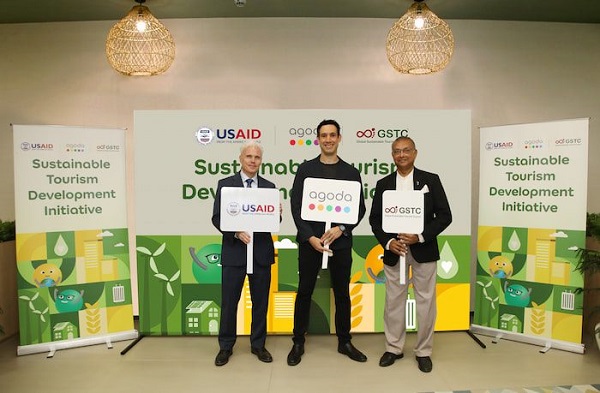Advancing Sustainable Tourism Development in Asia
The Sustainable Tourism Development Initiative Sets a Powerful Example of Public and Private Sector Partnership
Cadmus, through the United States-Support for Economic Growth in Asia (US-SEGA) and in collaboration with leading Asia-based partners Agoda and the Global Sustainable Tourism Council (GSTC), announce the launch of the Sustainable Tourism Development Initiative under the United States Agency for International Development (USAID) US-SEGA Private Sector Engagement Incubator for COVID-19 in Asia (PICA).
PICA Teams Up with Agoda and GSTC to Boost Sustainable Tourism in Asia

Initiated in 2022 following the global disruptions caused by the COVID-19 pandemic, PICA addresses the non-health, secondary impacts of COVID-19 on economic growth, with a focus on the digitalization of Small and Medium Enterprises (SMEs), job skills and mobility, sustainable tourism, and green growth. Leveraging the expertise and resources of the private sector, PICA prioritizes innovations and concepts with regional applicability.
In late 2023, US-SEGA finalized a groundbreaking partnership agreement with Agoda and GSTC to implement the Sustainable Tourism Development Initiative. Agoda, a renowned Asia-Pacific focused online travel platform, and GSTC, a global leader in establishing sustainable tourism standards, will collaborate with US-SEGA to advance sustainable tourism practices in the region.
Key components of the initiative will include:
- Expansion of instructor-led in-person trainings for hoteliers, targeting hotel management.
- Development of a self-paced digital training platform suitable for all levels of hotel staff.
- Implementation of a cohort-based learning approach for training delivery.
- Establishment of a sustainability scholarship fund for select hotels across the region, particularly those that are small, medium, and women-owned enterprises.
Earlier in March 2024, the Sustainable Tourism Development Initiative was launched at Agoda’s New Delhi offices, in a partnership celebration ceremony. Attendees included the Director for USAID/India’s Development Partnerships and Innovations Office Dr, Bryan Byrne, Agoda’s CEO Omri Morgenshtern, GSTC Vice Chair Mr. CB Ramjumar, and other dignitaries.
Initial Outcomes
Following the launch, a series of in-person sustainable training sessions occurred in Jaipur, India. Held over two days on March 28 and 29, 2024, the sessions engaged over 50 hotel management professionals, primarily from small and medium-sized hotels. The training covered sustainable tourism principles, GSTC Industry Criteria, best practices, and practical application methods.
Further in-person training sessions are scheduled from May to October 2024 in Nepal, Laos, the Philippines, and Indonesia, tailored to local contexts. To complement the face-to-face training, US-SEGA, GSTC, and Agoda are collaborating to develop a digital platform offering self-paced learning options for hotel staff.
Participants who complete the training will be eligible to take the GSTC Sustainable Tourism Training Exam to earn a Professional Certificate in Sustainable Tourism.
About US-SEGA
The US Support for Economic Growth in Asia (US-SEGA) is a six-year project designed to improve the policy environment for sustainable economic growth and prosperity, improved regional economic cooperation, sound management of institutions and good governance throughout APEC and the Indo-Pacific, while also expanding markets for U.S. goods and services. In addition to strengthening the Asia-Pacific Economic Cooperation (APEC) forum, US-SEGA offers missions a flexible mechanism to respond quickly to new opportunities through targeted technical assistance and training. It particularly supports workstreams focused on current and emerging economic growth issues including digital economy, workforce development, supply chain connectivity, and women’s economic empowerment. The program also supports missions in their ongoing response to the economic effects of the COVID-19 pandemic.
US-SEGA is managed by USAID’s Asia Bureau with partial funding and strategic direction from the U.S. Department of State.